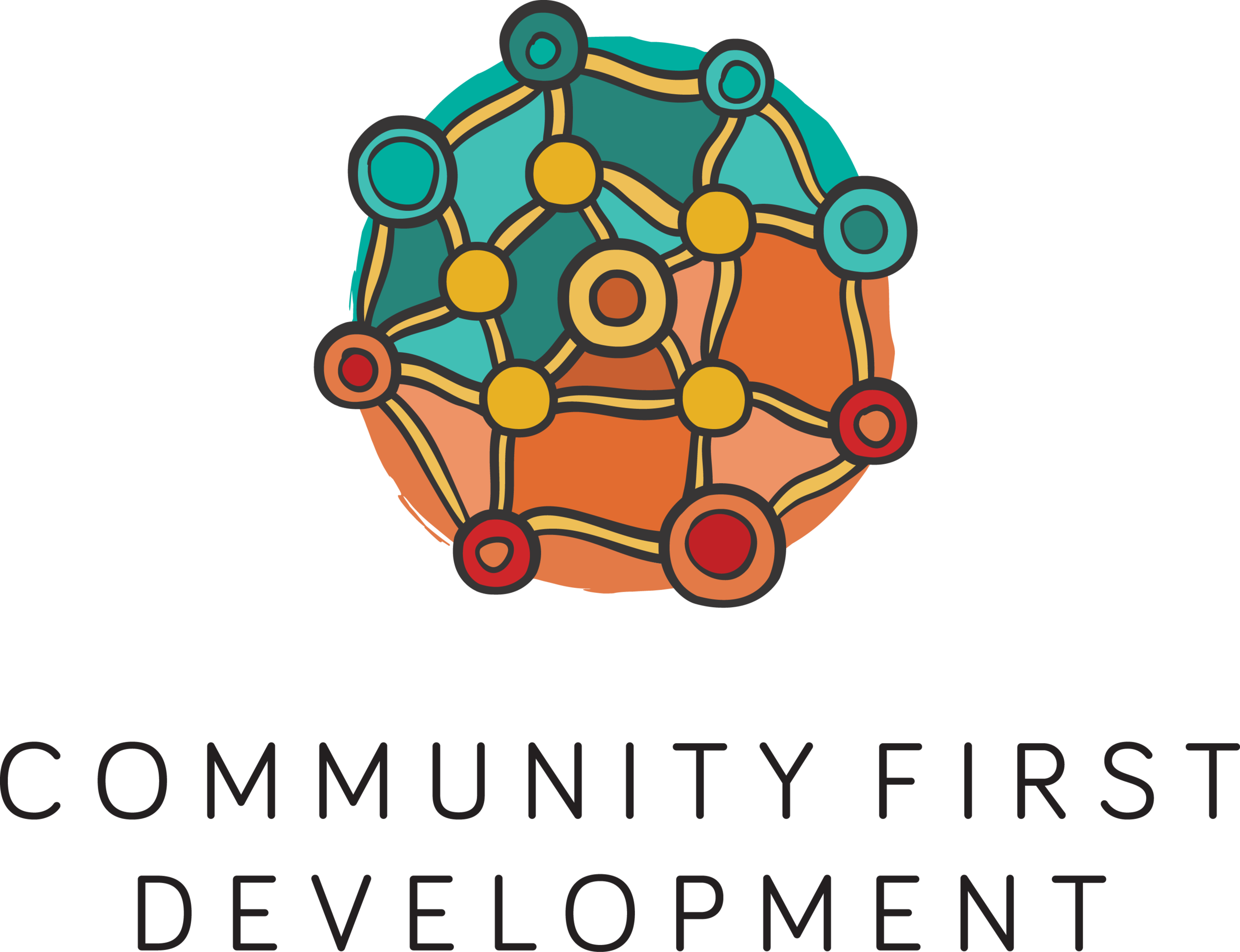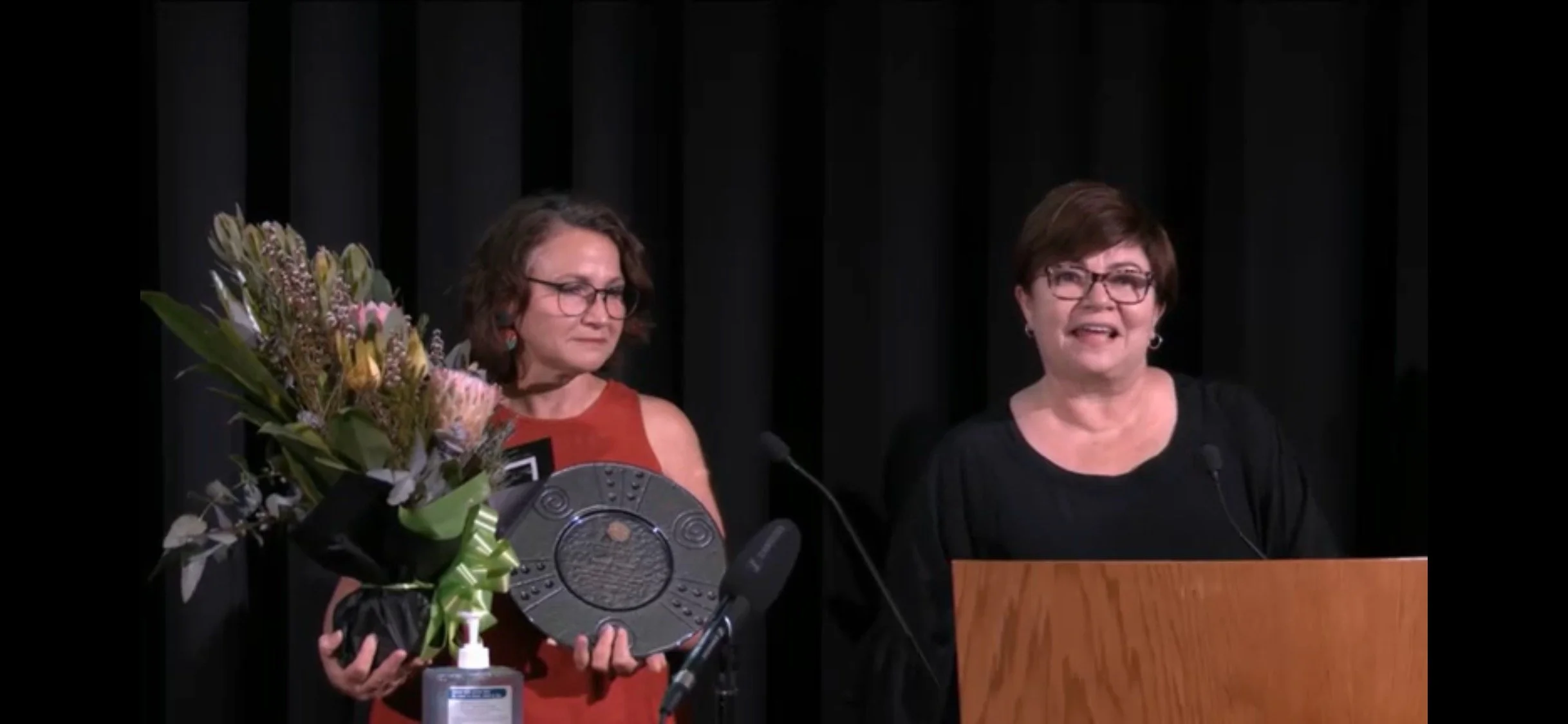Insights from Donna Stephens, Inaugural Research and Evaluation Fellow
Community First Development, Director, Lauren Ganley presenting an award to Miss Donna Stephens, Community First Development, Inaugural Research and Evaluation Fellow.
Following the Inaugural First Nations Research and Evaluation Fellow’s Oration earlier in the year, we caught up with Donna Stephens to ask some of the questions our audience had for her.
What sort of impact would you expect to see if we had more change organisations working with First Nations’ peoples?
Change organisations are able to enhance or bring reflective and reflexive practices to the community; and Aboriginal and Torres Strait Islander organisations would be able to better articulate, or make explicit, governance practices.
If we think about how that will benefit research, it becomes part of genuine collaborative practices and genuine co-design, and then connects to transformative practices where we can see measures of flourishing occur. This includes organisational citizenship; what that means is stronger ties to and between, and within organisations where people are connected to the organisations the way that people connect to Community First Development. You know, they are invited in that sense.
We also see this in defining roles. We gain some clarity around:
· What’s the role of community?
· What’s the role of community leadership?
· What’s the role of communication in the community; and be able to talk about that with the organisations we're working with.
The really important part is that there's longer and more sustained engagement, which is vital. From a personal perspective, academic work is not separate from communities and organisations. It's within them, how they do business, and Community First Development recognises that. They made that space for the academic work within the community and recognised the academic work that was actually going on within their own organisation.
What is your key learning from the participatory action research project you did with the 11 communities across Australia?
One of the important things we learnt was that communities were really engaged in the process because they were keen to explore their own practices. The conversations they had created space for them to do that. We also found that western practices dominate the space. In exploring what governance looks like in our community, we found western practices impacting Aboriginal ways of working. Community's intergenerational, multi-dimensional space was eroded. When we went back to talk to communities, that was something they wanted to explore. I think the next step is to work with those communities to research further what that looks like.
Donna, you were part of redesigning Community First Development's program theory. Do you have any advice for organisations designing programs in First Nations settings?
Community First Development works by invitation, and we can see the long history of them working in the community and how they work. The ecological model of change recognises that you can start at any place. Change can happen to an individual. It can begin with an organisation. But it starts at any place. In an ecological model, that activity of that action has a ripple effect, creating other changes. In terms of what that means for community development, specifically program theory, we think of that as a kind of a linear model e.g. we do this, and this happens. But in fact, all these other ripples occur. So ecological models are compelling when thinking about those multi-dimensional changes within communities.
Then there are the steps that are created by measuring that change. One of the things that Community First Development does, together with communities, is use the Seed to Tree scale to track what that change looks like and understand the ripple effect. That becomes part of the success criteria. It becomes a part of another question.
How does Yarning, as a research methodology, differ from more formal methods such as semi-structured interviews?
One of the underlying principles of Research Yarning is that the control really comes from the interviewed rather than the interviewer. This can be quite different to more traditional interview approaches where the interviewer is often in control of the conversation.
Research Yarning is an active rather than passive process, and it’s multi-layered. It asks the interviewer to push aside their values, beliefs and assumptions and listen deeply to build connections; not to what we hear but to what is being said. There might be times where you’re thinking, so how does this connect to the question that I asked to begin with? It’s really important that we remember that the person is telling you that story because of that question that you’ve asked; and so there is a connection for them. As the interviewer, it’s up to us to start to delve into how that connection can be drawn out more.
Donna, from your perspective, how can Communities of Practice benefit organisations?
Effective Communities of Practice can support the capacity of organisations to address processes and practices in ways that can shift attitudes and organisational culture. They do this through creating a space for shared understandings of the tacit, sometimes hidden /subconscious, and underlying beliefs, values and assumptions – both as they are and as we would vision them to be. They can provide a safe space for shared learning, reflection and problem-solving.
What are the key messages you want the audience to take away from your oration?
· Working with your staff is a key part of organisation change.
· It’s important to use and talk about how and why you use appropriate tools such as yarning and data analysis to do your work – many organisations attempt to do this but don’t ask how and why?
· Support for communities should include talking about what is happening in the community‑local, this includes site-focused truth telling.
· Governance support not Government support is where community change occurs. Organisations can flourish when we make the space and time for community governance practices to lead action.
Watch Donna Stephens, Research and Evaluation Fellow’s Oration here: https://www.youtube.com/watch?v=o_xT_ZPIVSw

